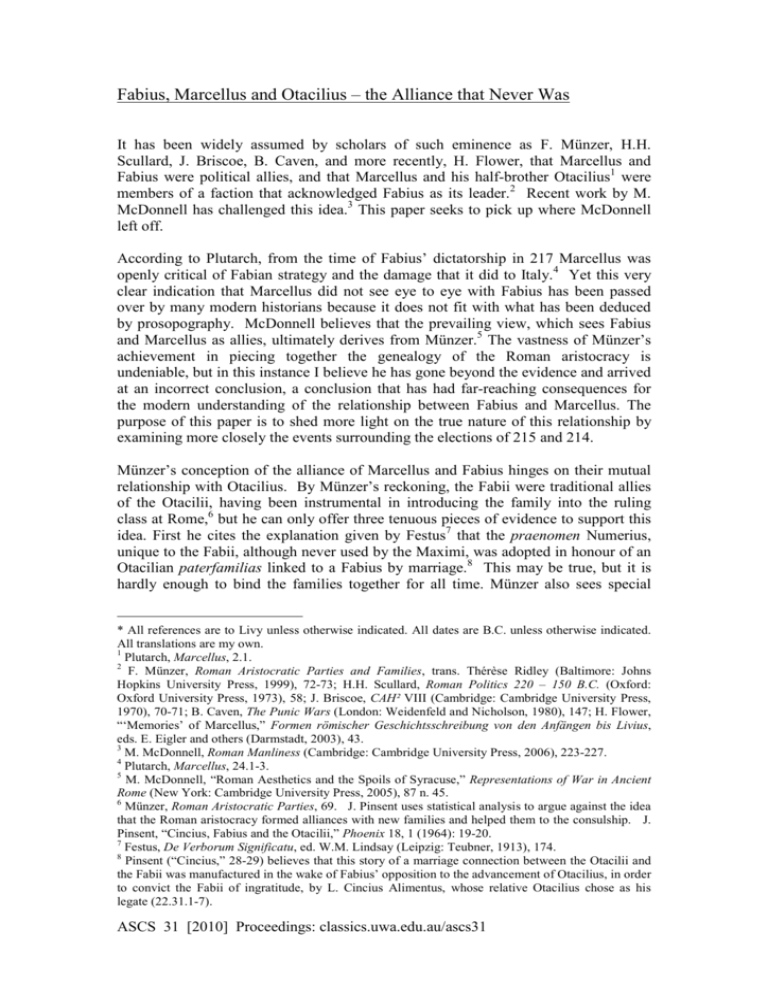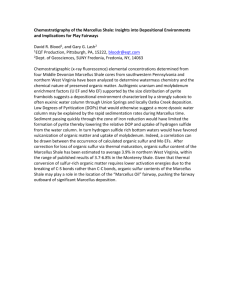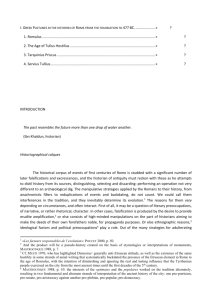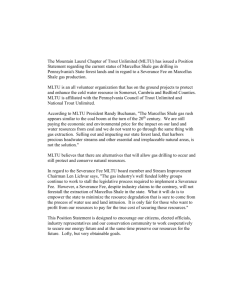Fabius, Marcellus and Otacilius – the Alliance that Never Was
advertisement

Fabius, Marcellus and Otacilius – the Alliance that Never Was It has been widely assumed by scholars of such eminence as F. Münzer, H.H. Scullard, J. Briscoe, B. Caven, and more recently, H. Flower, that Marcellus and Fabius were political allies, and that Marcellus and his half-brother Otacilius1 were members of a faction that acknowledged Fabius as its leader.2 Recent work by M. McDonnell has challenged this idea.3 This paper seeks to pick up where McDonnell left off. According to Plutarch, from the time of Fabius’ dictatorship in 217 Marcellus was openly critical of Fabian strategy and the damage that it did to Italy.4 Yet this very clear indication that Marcellus did not see eye to eye with Fabius has been passed over by many modern historians because it does not fit with what has been deduced by prosopography. McDonnell believes that the prevailing view, which sees Fabius and Marcellus as allies, ultimately derives from Münzer.5 The vastness of Münzer’s achievement in piecing together the genealogy of the Roman aristocracy is undeniable, but in this instance I believe he has gone beyond the evidence and arrived at an incorrect conclusion, a conclusion that has had far-reaching consequences for the modern understanding of the relationship between Fabius and Marcellus. The purpose of this paper is to shed more light on the true nature of this relationship by examining more closely the events surrounding the elections of 215 and 214. Münzer’s conception of the alliance of Marcellus and Fabius hinges on their mutual relationship with Otacilius. By Münzer’s reckoning, the Fabii were traditional allies of the Otacilii, having been instrumental in introducing the family into the ruling class at Rome,6 but he can only offer three tenuous pieces of evidence to support this idea. First he cites the explanation given by Festus7 that the praenomen Numerius, unique to the Fabii, although never used by the Maximi, was adopted in honour of an Otacilian paterfamilias linked to a Fabius by marriage.8 This may be true, but it is hardly enough to bind the families together for all time. Münzer also sees special * All references are to Livy unless otherwise indicated. All dates are B.C. unless otherwise indicated. All translations are my own. 1 Plutarch, Marcellus, 2.1. 2 F. Münzer, Roman Aristocratic Parties and Families, trans. Thérèse Ridley (Baltimore: Johns Hopkins University Press, 1999), 72-73; H.H. Scullard, Roman Politics 220 – 150 B.C. (Oxford: Oxford University Press, 1973), 58; J. Briscoe, CAH² VIII (Cambridge: Cambridge University Press, 1970), 70-71; B. Caven, The Punic Wars (London: Weidenfeld and Nicholson, 1980), 147; H. Flower, “‘Memories’ of Marcellus,” Formen römischer Geschichtsschreibung von den Anfängen bis Livius, eds. E. Eigler and others (Darmstadt, 2003), 43. 3 M. McDonnell, Roman Manliness (Cambridge: Cambridge University Press, 2006), 223-227. 4 Plutarch, Marcellus, 24.1-3. 5 M. McDonnell, “Roman Aesthetics and the Spoils of Syracuse,” Representations of War in Ancient Rome (New York: Cambridge University Press, 2005), 87 n. 45. 6 Münzer, Roman Aristocratic Parties, 69. J. Pinsent uses statistical analysis to argue against the idea that the Roman aristocracy formed alliances with new families and helped them to the consulship. J. Pinsent, “Cincius, Fabius and the Otacilii,” Phoenix 18, 1 (1964): 19-20. 7 Festus, De Verborum Significatu, ed. W.M. Lindsay (Leipzig: Teubner, 1913), 174. 8 Pinsent (“Cincius,” 28-29) believes that this story of a marriage connection between the Otacilii and the Fabii was manufactured in the wake of Fabius’ opposition to the advancement of Otacilius, in order to convict the Fabii of ingratitude, by L. Cincius Alimentus, whose relative Otacilius chose as his legate (22.31.1-7). ASCS 31 [2010] Proceedings: classics.uwa.edu.au/ascs31 significance in the fact that in 246 Fabius Licinius held the consulship alongside Manius Otacilius Crassus,9 but if we assume, as Münzer does, that the coincidence of consular colleagues is no coincidence, then surely there is more significance in the fact that the first Otacilius to reach the consulship served alongside a Valerius, as did the second.10 Münzer’s greatest proof of this continuing alliance, however, is the fact that at the time of the Hannibalic war T. Otacilius Crassus was married to the daughter of Fabius’ sister. If the girl that Otacilius married had been Fabius’ own daughter the match might be viewed as significant in forming or maintaining a connection between these men, but this girl was the daughter of Fabius’ sister, and this means that her first loyalty was to her father’s family, not the Fabii. On the basis of the praenomen, a shared consulship, and the union with this girl whose name was not Fabia, and who, before she came into the power of her new husband, was in the power of her own paterfamilias who was not a Fabius, Münzer accepts that the Fabii and Otacilii were bound together in alliance and thus he bases his interpretation of the known interactions between Fabius and Otacilius on that assumption. Hence Münzer reads a lot into the fact that Fabius and Otacilius were duumvirs together to vow and dedicate the temples of Venus Erycina and Mens, but, as will be revealed, their partnership on this project was entirely coincidental. When the Sibylline books commanded various religious acts to be performed the senate put the urban praetor M. Aemilius in charge of making all the arrangements and delegating the tasks (22.9.7-11). According to Livy the Sibylline books commanded that the temple to Venus be vowed by the highest magistrate in the state, which at that time happened to be the dictator Fabius (22.10.10). There was no prescription for who should vow the temple for Mens so it was vowed by one of the praetors, T. Otacilius. Champions of the alliance theory have seen in this evidence of Fabius using his influence for his ally Otacilius, but since it was not Fabius’ influence but his position as dictator that gained him his own appointment, it would be strange to argue that his influence was brought to bear for the other appointment, especially since Otacilius, a serving praetor, was the logical choice.11 There are certainly no grounds for Münzer’s belief that Fabius and Otacilius were “of one mind” on religious matters, and even less for suggesting that Fabius owed his appointment as pontifex in 216 to Otacilius (23.21.7).12 There were five other pontifices at that time who had a say in his co-optation, including the illustrious consulars Manlius Torquatus, Pomponius Matho and Papirius Maso, not to mention the pontifex maximus Cornelius Lentulus. Who was Otacilius to overrule such men? Having put to rest the idea that Otacilius and Fabius were anything other relatives-in-law whose service to state and religion occasionally overlapped, it remains to address the other half of Münzer’s equation, the supposed alliance between Fabius and Marcellus. In the wake of the disaster of Cannae Ti. Sempronius Gracchus and L. Postumius Albinus were elected consuls for 215, Albinus for the third time and in his absence. 9 Fasti Consulares et Triumphales in Inscriptiones Italiae, Vol. 13.1, ed. A. Degrassi (Rome: La Libreria dello Stato, 1947), 43. 10 Pinsent (“Cincius,” 20) argues against there being any significance in the coincidence of Valerii and Otacilii serving together. 11 The senate had placed Aemilius in charge of making arrangements for the religious transactions, so he would have been the one to delegate this task to Otacilius, just as he must have delegated the vowing of the ver sacrum to the praetor Cornelius Mammula and the building of a temple of Concord to Pupius and Quinctius (22.33.7-8, 33.44.1-2). 12 Münzer, Roman Aristocratic Parties, 78. 2 Why were these two men chosen when more qualified candidates, such as Marcellus and Fabius, were available and on the spot?13 At first glance this choice seems inexplicable, but upon a closer examination it makes more sense. While they saw the expedience of employing experienced consulars, the voters of Rome consistently tried to give opportunities to promising newcomers. With the exception of only three years, every year of the war saw at least one of the consuls elected new to the consulship.14 By electing Gracchus, they increased their pool of available magistrates, because it could be assumed that Marcellus, a proven commander, would have his command prolonged and they would still have the use of his services, which is exactly what did happen. Anxious to have him at the head of an army quod post Cannensem cladem unus Romanorum imperatorum in Italia prospere rem gessisset Marcellus was given a special grant of proconsular imperium (23.30.19).15 This just left the patrician position to be filled and, as it had been the year before,16 this was a bit trickier, especially if the voters wanted an experienced man to work alongside the newcomer Gracchus. Of the seventeen patricians who had been elected consul in the past twenty years, three were definitely already deceased,17 two were serving in Spain,18 and six, for reasons unknown, never undertook military service as a magistrate again.19 With regard to the remaining six, Furius Philus had been severely wounded on active service and was fighting for his life (23.21.2). Valerius Laevinus, since he had been forced to abdicate his consulship in 220,20 was unproven as a consul, so he had to work his way up the ladder again, a process which began 13 We know that both these men were in Rome at the time because Marcellus had been summoned to report on the war (23.24.1-2) and Fabius was petitioning to dedicate the temple of Venus (23.30.13). 14 The exceptions were 214 (24.7.12-24.9.3) and 210 (26.22.2-13) when the first choice of the voters had been discouraged, and 209 when the electing officer, despite tribunician protests, allowed himself to be elected (27.6.3-12). Each of these elections had certain irregularities attendant. The elections of 214 were notorious for the interference of Fabius. In 210 the voters’ initial choice was overturned by a candidate who refused to be elected on the grounds of failing eyesight. Even so, it could be argued that one of the magistrates eventually chosen, Laevinus, was new to the consulship, because although he had been elected consul in 220, he had been forced to abdicate, so he had never served as consul. In 209, despite the protests of the tribunes, the presiding magistrate allowed himself to be elected (27.6.112). 15 “...because he was the only one of the Roman generals who had conducted matters successfully after the Cannae disaster.” 16 In the elections for 216, despite the anti-Varronian explanation that Livy gives, the reason that the elections were delayed would seem to be that none of the patrician candidates satisfied the voters enough to get a majority. The proposal of Aemilius Paulus seems to have been a remedy for this stalemate. 17 Aemilius Paulus and Servilius Geminus died at Cannae (22.49.12-18). The sons of Aemilius Lepidus put on funeral games for him at the end of 216, but the time and manner of his death are not mentioned (23.30.15). 18 Gnaeus and Publius Cornelius Scipio. 19 These included C. Papirius Maso, M. Aemilius Barbula, P. Valerius Flaccus, M. Valerius Messala, L. Aemilius Papus, and L. Veturius Philo, who had been appointed dictator for the elections for 216. Of these six, only Aemilius Papus is known to have still been alive after Cannae, when he was appointed bank commissioner (23.21.6). T.R.S Broughton considers that the P. Valerius Flaccus serving as praefectus classis (23.38.7) in 215 is the consular. T.R.S. Broughton, Magistrates of the Roman Republic Vol. 1, (New York: American Philological Association, 1951-1952), 257. It might be so, but Livy gives no indication that this man was an ex-consul, so the identification remains uncertain. 20 We do not have Livy’s account for the year 220 and the evidence of the Fasti Consulares is also missing for this year, but in the entry for 210 it states that Laevinus was consul for the second time (Insc. Ital. 13.1, 47) The Chronograph of 354 A.D. lists Laevinus as the consul for 220. Since Zonaras (8.20) records that two other consuls undertook a campaign in 220, both Laevinus and his colleague must have been forced to abdicate soon after taking up their post. 3 when he was elected praetor for the second time in 215 (23.24.4). Cornelius Scipio Asina served as an interrex during 217 but is not heard of again until he proposes recalling all forces to defend Rome against Hannibal several years later (26.8.2). If this timid and ill-advised proposal was characteristic of his whole approach to the war, it would seem unlikely that he sought active service and even less likely that he would inspire the voters to choose him. Then there were three. Fabius Maximus, Manlius Torquatus and Postumius Albinus had all been consul twice previously. Albinus had shown his willingness to serve by accepting the lesser magistracy of praetor. Manlius, although active in senatorial debates, never again sought a command and even refused one that was offered to him because of ill-health.21 Fabius, on the other hand, by the firm grip he kept on the consulship over the next two years and his continued role as ‘advisor’ to his son, demonstrated that he wanted to be involved and that he wanted the war fought his way. If, as both Livy and Münzer claim, Fabius and his strategy had been thoroughly vindicated by the defeat at Cannae,22 this was the time for the Romans to demonstrate the fact by putting direct control of the war back into his hands. It is interesting that the voters preferred to elect Albinus, who was far away in Gaul serving as praetor, rather than elect Fabius, who was certainly in Rome at the time. When Albinus was killed in action before he could take up the consulship, it became necessary to elect a suffect consul. The senate decreed that this election should take place as soon as possible with due regard for the auspices (23.25.9). In the intervening period Fabius, who had petitioned the senate for permission to dedicate the now completed temple of Venus Erycina (23.30.13), completed the dedication, along with Otacilius who dedicated the temple to Mens (23.31.9). The timing may be a coincidence, but if this was Fabius’ way of focussing public attention on himself and advertising his availability, the result would hardly have gratified him. Rather than supporting Fabius, who was possibly the only experienced consular patrician actually wanting to serve, the people chose to break with tradition and clamoured for the election of Marcellus who was a plebeian and therefore not strictly eligible. It was at this time that Marcellus was sent out of Rome to transport some soldiers between camps. Was this, as it seemed to the voters at the time (23.31.7), a plot to get Marcellus out of the way while the elections were held? Because the new consular year had already started, the Romans could have their new consul immediately, and this is what they needed. If there were sinister intentions behind sending Marcellus away at the crucial time, this must have been the motivation rather than the feeble “out of sight, out of mind” principle. The interested parties were counting on the fact that Rome needed a second consul quickly, so the voters would be forced to choose someone who was at hand to take up the post. What they did not count on was the determination of the people, including many senators, to have the 21 He did, in fact, serve as temporary commander later in 215 in response to an emergency situation which arose in Sardinia, in which his expertise, as a former governor of that island, was needed (23.34.15). After a thorough and expeditious success in Sardinia, had he wished to continue in active service or pursue the consulship again, it seems reasonable to assume that the voters would have welcomed his candidature. The fact that he never undertook another command, and within five years refused the consulship that was offered because his eyesight was failing strongly suggests that he did not hanker after active service (27.22.2-6). 22 Münzer, Roman Aristocratic Parties, 62-63 4 consul they wanted.23 Rumbles were heard in the senate-house (23.31.6-7). Gracchus hastened to reassure them that the elections would not be held until Marcellus returned (23.31.8). When Marcellus returned he was elected consul by a huge majority (23.31.13). The opposition to Marcellus had not been able to prevent his election, but what if they could prevent him from carrying out his magistracy? If the gods objected, the people would have to accept it, but the gods would have to send just the right omen at just the right time.24 If a bad omen occurred before or during the election, the election would simply have been postponed, and the voters had already demonstrated their willingness to wait. The election had to go through. It had to appear that the gods approved of the election, but did not approve of Marcellus carrying out his consular duty. As Marcellus was performing his inaugural sacrifice, it thundered (23.31.13). It seems too much of a coincidence. Livy does not elaborate on how the event played out, whether the thunder was heard by the whole crowd or was merely reported, but a set-up seems likely. There are many ways to simulate the sound of thunder. A semiflexible sheet of beaten metal shaken the right way would suffice, so the event might have been staged so it could be heard by the entire crowd. On the other hand, it might have been witnessed only by carefully preselected people, possibly, but not necessarily, including a certain senior augur of the Fabian clan.25 The augurs were summoned and concluded that Marcellus was creatus vitio (23.31.13). Marcellus abdicated and since the people had run out of other experienced and willing patrician candidates they had to elect Fabius. Marcellus’ acceptance of the warning of the gods and his adherence to tradition has been used to suggest that he was willing to step down, and even that it was his plan all along, in order to get Fabius elected.26 The fact that both Marcellus and Fabius were augurs has been considered significant.27 This reasoning ignores the fact that Marcellus was bound to act as he did. Whether the “thunder” was widely witnessed or 23 Caven, The Punic Wars, 147. Caven considers that the popular movement was dead and that the people more or less abdicated its participation in the government. This idea seems utterly inconsistent with the popular support for Marcellus, the one man they could count on not to back out of a fight, and their insistence on a top post for him in 215 even if it meant breaking with tradition. Likewise, Fabius might have struck a telling blow against the authority of the people in the interests of his own family in the elections for 214, but he did not stop the people from electing their erstwhile favourite Marcellus, and their current favoured candidate Otacilius. 24 J. Linderski, “The Augural Law,” ANRW 2.16.3, ed. H. Temporini, (Berlin: Walter de Gruyter, 1986), 2171. 25 Perhaps it is wrong to suspect any involvement on the part of Fabius, but his personal history is littered with bad omens which just happen to oust his predecessors from office. In 231 B.C. Manlius Torquatus and Fulvius Flaccus had to abdicate the censorship because of a vitium. In the next year Fabius and Sempronius Tuditanus successfully carried out the censorship. According to Plutarch the squeak of a mouse just as the dictator Minucius was appointing Flaminius his master of horse forced them to resign (Marcellus, 5.4). We have no specific testimony that Fabius was then appointed dictator, but inscriptional evidence suggests that he was dictator twice, and this is the only time when a dictator was known to have been appointed that is unaccounted for by the Fasti Capitolini so it is the only window of opportunity. Valerius Maximus gives a version in which Fabius was the dictator who was squeaked out of office, but this confusion is understandable given the association of Minucius and Fabius in the historical tradition, especially if Fabius was the next dictator appointed (1.1.5). 26 Münzer, Roman Aristocratic Parties, 72; Scullard, Roman Politics, 57-58. 27 Münzer has no doubts that Fabius engineered this scenario calling upon his influence over the augurs, but believes that he was working with Marcellus rather than against him (Roman Aristocratic Parties, 72). 5 was simply reported, once the report had been made public the magistrates involved had to summon the augurs and abide by their recommendation. Even if Marcellus doubted its veracity, he knew better than most that the appearance of a bad omen was more important than its substance, as his action when charging into battle at Clastidium clearly shows.28 To complain or try to cast doubt on it would be to call into question the state religion, one of the mainstays of hope at that time. Marcellus chose not to take that course, but the fact that he resigned gracefully should not be taken as proof that he resigned happily or that he had always planned to resign. Marcellus wanted to be consul. He never wavered in his belief that he had the ability to challenge Hannibal effectively under the right circumstances. It is barely conceivable that he would willingly yield this authority to anybody, much less Fabius, whose ideas on how the war should be conducted were so different from his own. Fabius had finally grabbed hold of the tiller again and learned a valuable lesson in the process. He was consul, but only by the skin of his teeth. He had been passed over twice. Obviously the people of Rome could not be trusted to make the “right” decisions when it came to electing magistrates. He would have to make sure that in future such important decisions were not left to chance. As he was now Marcellus’ superior, Fabius sent him to defend Nola. Using Nola as a base Marcellus made such a nuisance of himself with successful raids into the territory of the rebellious Samnites and Hirpini that these peoples called in Hannibal to protect them (23.41.13-14). After Marcellus fought off an attack by Hannibal, in which, if the figures can be trusted, he had a moderate victory (23.46.2-4), he was hamstrung by the consul Fabius, who ordered him to disband his army and keep only a skeleton garrison at Nola (23.48.2). The reason given by Fabius for this extraordinary interference was to avoid Marcellus’ army being a burden to the allies, but this policy was not extended to any other Roman army or commander at this time.29 Marcellus was singled out, and his ability to campaign actively was crippled. This seems very much more like the action of a jealous rival afraid of being shown up than a political ally. It also completely negated the intentions of the Roman people, who had made it indisputably clear that they wanted Marcellus to be active at the head of an army. It would not be the last time that Fabius acted contrary to the mandate of the people, and held his own opinion and interests as more important than those of everyone else. Returning from the field to hold the elections for 214, Fabius sent ahead to announce the date and then made sure he did not re-enter Rome before the election (24.7.11). This manoeuvre seems to have been deliberately planned by Fabius so that he would retain his full military imperium, which allowed him to use force without appeal.30 28 His horse, frightened by the shouts of the enemy, turned and bolted away. Knowing that this might be interpreted as a bad omen, he pretended that the manoeuvre was deliberate and went through the motions of praying to the sun (Plutarch, Marcellus, 6.5-6). 29 If Fabius was so concerned about the citizens of Nola, perhaps he should not have relieved them of their supplies in order to provision his own winter quarters (23.46.9). 30 The magistrate holding an election would usually be residing in the city, so he would not have his full military imperium. It was also customary for a consul who called the comitia centuriata into session to lower his fasces as a sign of respect for the sovereignty of the Roman people who had bestowed his magistracy (Cicero, De Republica, 2.31.53). By not entering the city first Fabius retained his full imperium, signified by the axes in his fasces, which allowed him to flog or behead anyone who impugned his majesty without their having recourse to the ius provocationis (24.7.11, 24.9.1). R. Drews, “Light from Anatolia on the Roman Fasces,” American Journal of Philology 93,1 (1972): 44. 6 Why go to all that trouble unless he intended the elections to go his way or else? When the first century gave as its choice Aemilius Regillus and Otacilius Crassus, Fabius stopped the voting and denounced these men as unsuitable to command. Claiming that he was putting the welfare of the state before that of his niece’s husband, he attacked Otacilius’ military record and called upon the Romans to choose proven commanders (24.7.12-8.20). He sent the first century to vote again. When Otacilius protested at his interference and accused him of wishing to prolong his own magistracy, Fabius threatened him with summary execution (24.9.1-2). Münzer would have us believe that this was pre-arranged between the men, and interprets Otacilius’ subsequent election as praetor for a second time as the promised compensation for taking the fall. This idea is full of flaws. Otacilius would have had to have been fanatically loyal to Fabius to give up what, for all he knew, was his only chance at the consulship to advance Fabius’ cause, and once Fabius had effectively destroyed Otacilius’ credibility as a commander, how could he then ensure that Otacilius would be elected as praetor? This action should be seen for what is was, not some pre-arranged playacting between allies, but a ruthless, last-ditch attempt for Fabius to hold on to power and keep running the war his way. It is difficult to see how Fabius could force the electorate to vote the way he wanted, but consider the mental state of the first century to vote. It is entirely likely that Fabius’ unorthodox behaviour and sinister references to his full military authority sufficiently unnerved the crowd of voters so that nobody wished to become a marked man by opposing the will of Fabius.31 If the voters did not wholeheartedly believe or support Fabius, as their continued faith in Otacilius suggests, why did they elect not only Fabius himself as consul, but his son as praetor for 214? Perhaps the voters saw that the best way to get through the process without further delays or unpleasantness was to placate Fabius by electing him consul. Likewise, when it came time for the praetorian elections, by electing Fabius junior as a sweetener they could also slip in a candidate whom they still supported, T. Otacilius. Nevertheless they still had to find a consular colleague for Fabius who satisfied the criteria Fabius had outlined. Marcellus was the obvious choice. Champions of the alliance theory believe that because Marcellus was elected, he must have been an ally of Fabius, because Fabius would not have allowed someone whom he did not support to be elected. This reasoning conveniently ignores the fact that Fabius had already shown his lack of support for Marcellus as a commander by reducing him to garrison duty. Yet although the evidence actually suggests that Marcellus was the last colleague he would have chosen, Fabius could not prevent him from being elected, because not even Fabius could have credibly argued that Marcellus was unsuitable on military grounds. Choosing Marcellus might also be construed as an act of defiance on the part of the voters. Fabius, by his interference and threats, might have made it expedient to elect Numismatic evidence supports the conclusion that it was not until some years later that the ius provocationis was modified by a Lex Porcia so that citizens were protected from a magistrate with full imperium outside as well as inside the city limits. S.P. Oakley, A Commentary on Livy, Books VI-X, Vol. 4 (Oxford: Oxford University Press, 2005), 132. 31 As Marshall (“Symbols and Showmanship,” 130) points out, as a portable kit for flogging and/or beheading, the fasces never became just decorative paraphernalia, but continued to be the symbol and the instrument of a magistrate’s imperium, and therefore engendered dread in the populace, especially when the axes were in place. 7 him, but that did not mean he should have it all his own way. The Roman People had been denied Marcellus as consul the year before and Fabius had received the authority intended for Marcellus. Fabius had even taken away Marcellus’ army. Now Fabius was trying to take away their sovereign right to choose their own officials. Fabius might browbeat them into passing over Otacilius, but not Marcellus. Let him try to object when in the same breath they shouted the names Quintus Fabius Maximus and Marcus Claudius Marcellus as their choice. The links which allegedly bound Otacilius to Fabius are so remote and tenuous as to be almost inconsequential, and Fabius’ actions at the election for 214 would surely have put a halt to any previous cordial relations between these men. As for the idea that Fabius and Marcellus were allies, even putting aside all the other evidence for jealousy and ill-will between the two and confining our view to the elections of 215 and 214, every glimpse that we get of what was happening behind the scenes suggests that Fabius and Marcellus were rivals, diametrically opposed in their views of waging war, so any scenario that sees them as allies can only be arrived at by passing over or interpreting subjectively the evidence that we do have, and assigning illogical motives to explain the result. The champions of the alliance theory have looked at the results of the elections for 215 and 214 and decided that such outcomes could not be possible without being part of a master plan, so a master plan was discovered which linked Fabius, Marcellus and Otacilius. Closer examination has revealed that this is an alliance that never existed. Paula Johnson University of Queensland Ancient Sources “Chronography of the year 354” in Chronica Minora, Vol. 1, ed. T. Mommsen. Berlin. Weidmann, 1892. Fasti Consulares et Triumphales in Inscriptiones Italiae, Vol. 13.1, ed. A. Degrassi. Rome. La Libreria dello Stato, 1947. Cicero, De Republica De Legibus, trans. C.W. Keyes. London. Heinemann, Loeb Classical Library, 1928. Festus, De Verborum Significatu quae Supersunt cum Pauli Epitome, ed. W.M. Lindsay. Teubner, 1913. Plutarch, “Marcellus” in Plutarch’s Lives, Vol. 5, trans. B. Perrin. London. Heinemann, Loeb Classical Library, 1916. Zonaras, “Epitome Historiarum” in Dio’s Roman History, trans. E. Cary. London. Heinemann, 1914-27. Livy, Ab Urbe Condita XXI – XXV, edited by C.F. Walters and R.S. Conway. Oxford. Oxford University Press, 1964. Livy, Ab Urbe Condita XXVI – XXX, edited by R.S. Conway and S.K. Johnson. Oxford. Oxford University Press, 1964. 8 Bibliography Briscoe, J. "The Second Punic War." In The Cambridge Ancient History VIII, 2nd edition, edited by A.E. Astin, F.W. Walbank, M.W. Frederiksen, R.M. Ogilvie. Cambridge: Cambridge University Press, 1989. Broughton, T.R.S. The Magistrates of the Roman Republic. Vol. 1. New York: American Philological Association, 1951-1952. Caven, B. The Punic Wars. London: Weidenfeld and Nicholson, 1980. Drews, R. "Light from Anatolia on the Roman Fasces." The American Journal of Philology 93, no. 1 (1972): 40-51. Flower, H.I. "'Memories of Marcellus'." In Formen römischer Geschichtsschreibung von den Anfängen bis Livius, edited by U. Eigler, 39-52. Darmstadt: Wissenschaftliche Buchgesellschaft, 2003. Linderski, J. "The Augural Law." In Aufstieg und Niedergang der römischen Welt 2.16.3, edited by H. Temporini, 2146-312. Berlin: Walter de Gruyter, 1986. Marshall, A.J. "Symbols and Showmanship in Roman Public Life: The Fasces." Phoenix 38, no. 2 (1984): 120-41. Münzer, F. Roman Aristocratic Parties and Families. Translated by T. Ridley. Baltimore: Johns Hopkins University Press, 1999. McDonnell, M. "Roman Aesthetics and the Spoils of Syracuse." In Representations of War in Ancient Rome, edited by S. Dillon and K.E. Welch, 79-106. Cambridge: Cambridge University Press, 2005. McDonnell, M. Roman Manliness. Cambridge: Cambridge University Press, 2006. Oakley, S.P. A Commentary on Livy, Books VI-X. 4 vols. Vol. 4. Oxford: Oxford University Press, 2005. Pinsent, J. "Cincius, Fabius and the Otacilii." Phoenix 18, no. 1 (1964): 18-29. Scullard, H.H. Roman Politics 220-150 B.C. Oxford: Oxford University Press, 1983. 9






